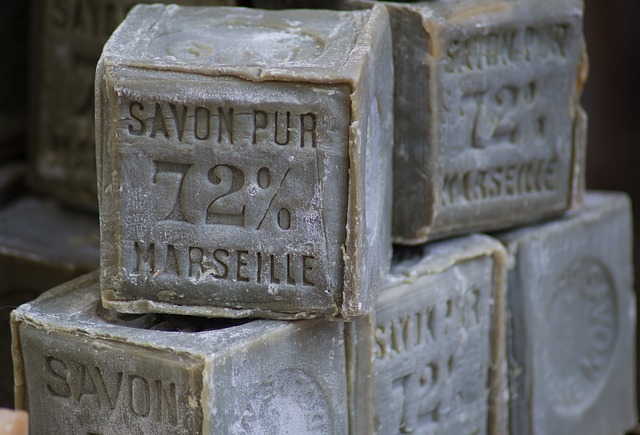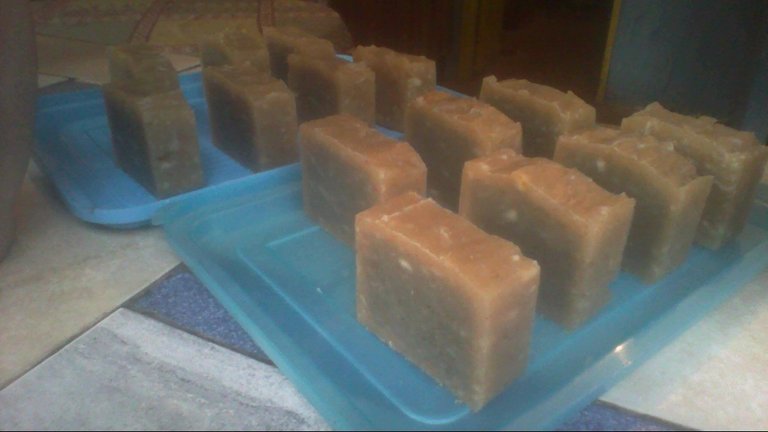Marseille soap and 72%/ENG-ESP/Jabón de Marsella y el 72%
We do not seek the holy grail, nor the philosopher's stone, we addicts to the noble art of saponification seek to make non-aggressive products for the skin and / or the environment while we take care of ourselves, we learn about very different topics: Chemistry, botany, art, technology and countless others related to different cultures or history, like this one in which without naming them he took me to know a little about Syria and its ancient traditions, France and the beautiful city of Marsella and medieval Spain and its oil and soap industries with Arabic names for the lands of Al Andalus.
Almazara(Oil mill): Place, mill or industry where oil is obtained from olive or olive.
Almona: Soap shop, place where soap is made

FuenteTraditional Marseille soap/Tradicional jabón de Marsella
Jabones del mundo: Marsella, Castilla, Alepo. Formulas que le quitan el sueño a los aficionados al arte de la saponificación, aunque hay otras que acaparan el interés, como por ejemplo las bases transparentes, pero las tres antes mencionadas cuentan con una historia de siglos, algunos dirán que milenaria, pero en tal caso las técnicas ya no son las mismas. Desde que se industrializó la producción del hidróxido de sodio la jabonería se tecnificó y simplificó sus procedimientos; mas las formulas precisas son secretos que guardan celosos los fabricantes.
72 %
Este numero impreso en la pastilla de jabón se refiere a la cantidad de aceites vegetales empleados en la elaboración, que suelen ser: Oliva, palma y coco principalmente, pues aseguran los jaboneros españoles que los franceses en su afán de competir con el afamado jabón de castilla (100 % aceite de oliva) optaron por sustituir la oliva por grasas más económicas, con la ventaja de que el aceite de coco aporta muchas burbujas.
¿Si el 72 % es aceite, que es el resto? - El restante 28 % (y esto según mi experiencia y alguna que otra lectura) está constituido por: Un 9 % de hidróxido de sodio (sosa caustica) y un 19 % de agua o humedad que con el tiempo disminuirá.
Jabones elaborados por mí, con con los tres aceites mencionados (oliva, palma y coco) con adicción de harina de avena
Soaps made by me with the three oils mentioned (olive, palm and coconut) with an oatmeal addiction
Con seguridad los jabones de hoy, aunque no contengan colorantes y fragancias, contienen pequeños porcentajes de aditivos quelantes, como el citrato de sodio, que entre otros beneficios contribuye a que no se tapen las tuberías y no es nocivo y lactato de sodio que los hace más duros y por lo tanto duraderos.
No buscamos el santo grial, ni la piedra filosofal, nosotros, los adictos al noble arte de la saponificación buscamos hacer productos no agresivos para la piel y/o el ambiente, al tiempo que nos ocupamos, aprendemos sobre muy distintos temas: Química, botánica, arte, tecnología e infinidad de otros relacionados con diferentes culturas o historia, como este en que sin nombrarlos me llevó a conocer un poco de Siria y sus tradiciones milenarias, Francia y la hermosa ciudad de Marsella y de la España medieval y sus industrias aceitera y jabonera con nombres árabes por las tierras de Al Ándalus.
Almazara: Lugar, molino o industria donde se obtiene el aceite a partir de la oliva o aceituna.
Almona: Jabonería, lugar donde se fabrica jabón

And anyone who's lived in Marseille like I have, knows the best and most authentic place to buy your savon de Marseille is chez Marius Fabre🙏
https://www.marius-fabre.com/fr/3-savon-de-marseille
This soap, although very slippery, is used for everything from the bodywashing to the floors to the laundry. It is the passe-partout de Marseille. Rince well when washing floors😅
Gracias. Por leerlo y comentar. Mi adicción es hacer jabones e idear nuevas fórmulas. Lee todo acerca del tema.
A mi prefiero los jabónes prensados en frío🤩 Un día los fabricaré. Adoro fabricar los cosmeticos en DIY💟 Esta mas mejor por mi salud!🙏